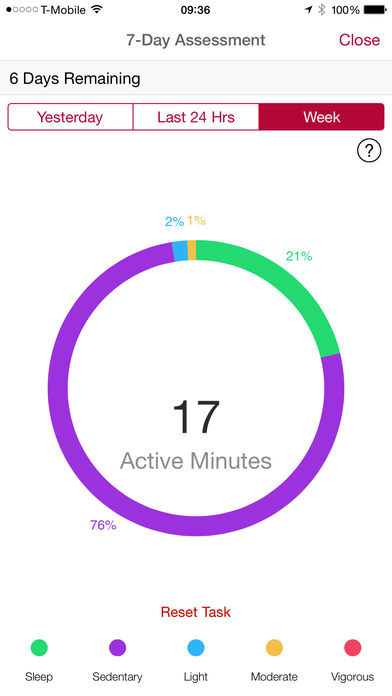
Jacoblund / Getty Images
More than a year and a half ago, Apple unveiled a new breed of iPhone apps that would let people participate in scientific studies anytime, anywhere — at least in theory. Now, a new study indicates that smartphones do have the potential to capture useful data about thousands of people’s health and exercise habits in their daily lives, not just during a trip to the doctor or a clinical trial center.
But it also shows that if iPhones are to become the next big tool in science, researchers will have to conquer a challenge familiar to every app developer: how to keep people from getting bored and quitting.
The study, published Wednesday in JAMA Cardiology, reveals the first results of an app that was part of Apple’s much-hyped foray into health, a field that has been relatively slow to digitize. “This is the blossoming of mobile device medical research,” said Eric Topol, a cardiologist and genetics researcher at the Scripps Research Institute, who was not involved with the study, in an interview with BuzzFeed News.
At a widely publicized and livestreamed event in March 2015, Apple introduced ResearchKit, a tool to build apps to study conditions like breast cancer, Parkinson’s disease, type 2 diabetes, and asthma — to name a few of the ResearchKit apps that launched that month.

MyHeart Counts
Via itunes.apple.com
One of the apps, MyHeart Counts, run by a team at Stanford University, aimed to measure people’s cardiovascular health. Between March and October 2015, nearly 50,000 people from all 50 states signed up for the weeklong study, and 40,000 of them submitted health data of some kind. These unusually high numbers suggest that smartphone-conducted studies can reach many more people than traditional studies ever have.
Before this, “there hasn’t been 40,000 patients capturing their data about their activity through a medical research app,” Topol said. “That is a standout.”
At the same time, relatively few people took the extra step of doing some of the tasks that the app asked them to do. Just shy of 5,000 people completed a six-minute walk test, a common proxy of heart health, with their phones in hand, according to the study. And while 40,000 people filled out some portion of the app’s health questionnaires, only about 1,300 provided all the information needed to calculate their personalized health risks.
That squares with a recent study that showed that for the first five ResearchKit apps that launched, including MyHeart Counts, the percentage of daily users quickly dropped to 25% or below within the first three months.
“This is a very significant problem with this new form of medical research,” Topol said. “You accrue lots of people, but to keep them engaged, long-term, is perhaps the greatest challenge.” Apps could keep people coming back, he suggested, by offering participants something valuable in return, like personalized insights about their health.
While Euan Ashley, the study’s senior author, acknowledges the steep drop-off rate, he sees those figures optimistically. Although only 10% or so of eligible people did the six-minute test, Ashley noted, this group was about 10 times bigger than any other study of people doing the same test. Clinical trials in general sometimes see 30% or more of patients drop out.
The app was also valuable, he said, because it monitored people’s physical movements in the background. It showed, for example, that people were active about 15% of the time their movements were recorded in a week (assuming that people carried their phones or wore a fitness-tracking device when on the go).
“Instead of asking ‘How many steps did you take last week?’, ‘How many flights did you climb?’, we can actually measure that. I think that’s a groundbreaking thing.”
“The scope of it and scale of it is new and represents a huge opportunity,” Ashley, an associate professor of cardiovascular medicine at Stanford University School of Medicine and one of the leaders of the MyHeart Counts study, told BuzzFeed News. “Instead of asking ‘How many steps did you take last week?’, ‘How many flights did you climb?’, we can actually measure that. I think that’s a groundbreaking thing.”
When MyHeart Counts and the other original ResearchKit apps launched, no one — including researchers — knew whether people would be receptive, Ashley said. Since then, several more ResearchKit apps have launched.
“Given that these launch studies were the first of a kind, the idea you could use these devices that fit in everyone’s pockets and pull them out multiple times a day for clinical research to help patients — that was unknown,” he said. “The number-one finding that we’re reporting is that this is possible.”
While all clinical trials struggle to enroll a diverse and representative group of patients, this study’s demographics also underscore some inherent challenges to smartphone studies. Obviously, only people with the financial means to own iPhones could participate. And while clinical researchers traditionally meet their subjects in person, that’s not possible when the study is done exclusively through an app. So it’s possible that a small number of people purposely faked their data, Ashley acknowledged, although he doubts that the group was big enough to skew the data.
Christine Lemke, president of Evidation Health, a startup that studies and validates health apps, called the study a promising look at the potential future of research.
“It’s feasible to deliver studies like this,” she said. “More of them, please.”
from BuzzFeed - Tech https://www.buzzfeed.com/stephaniemlee/researchkit-heart-health-study?utm_term=4ldqpia
No comments:
Post a Comment